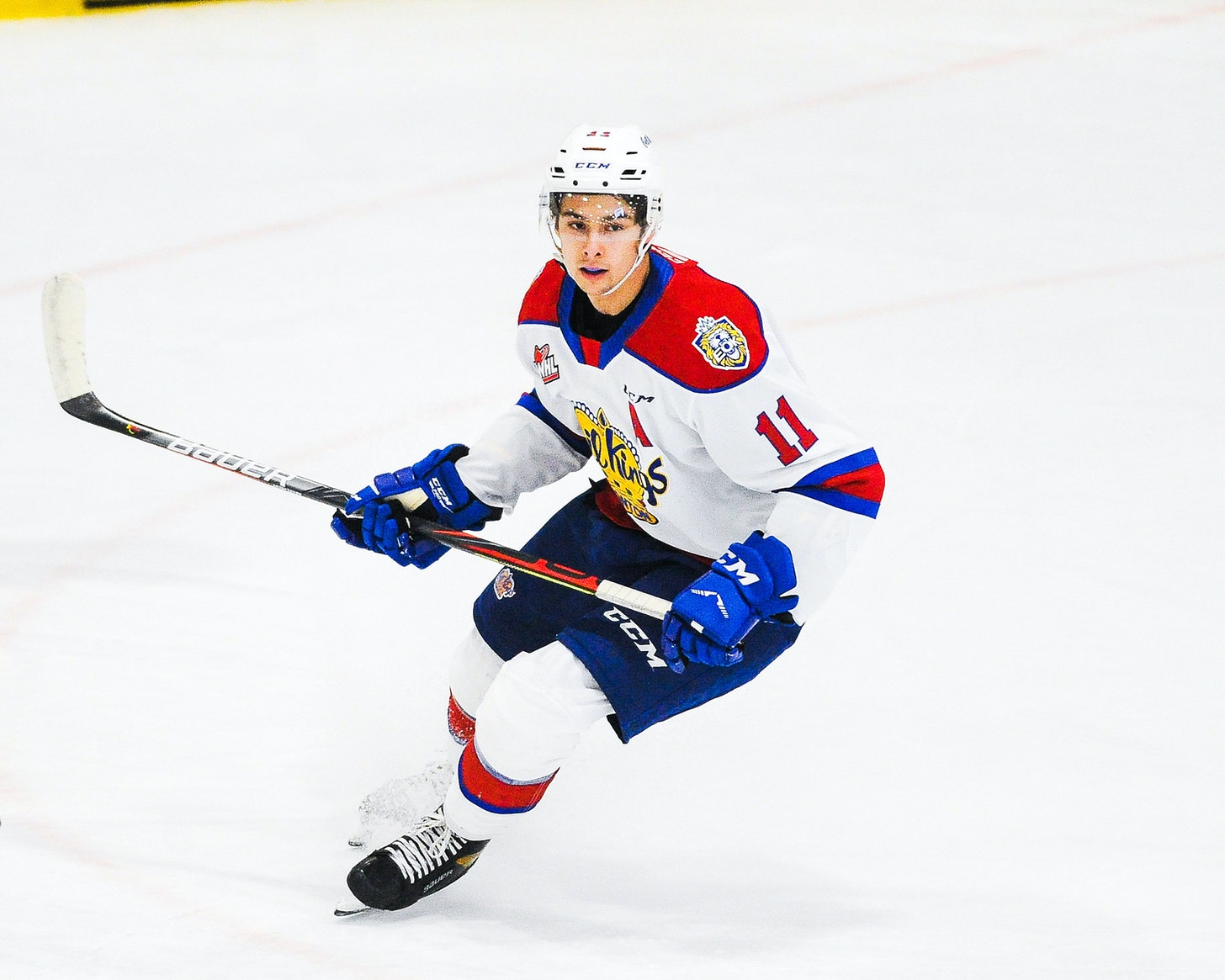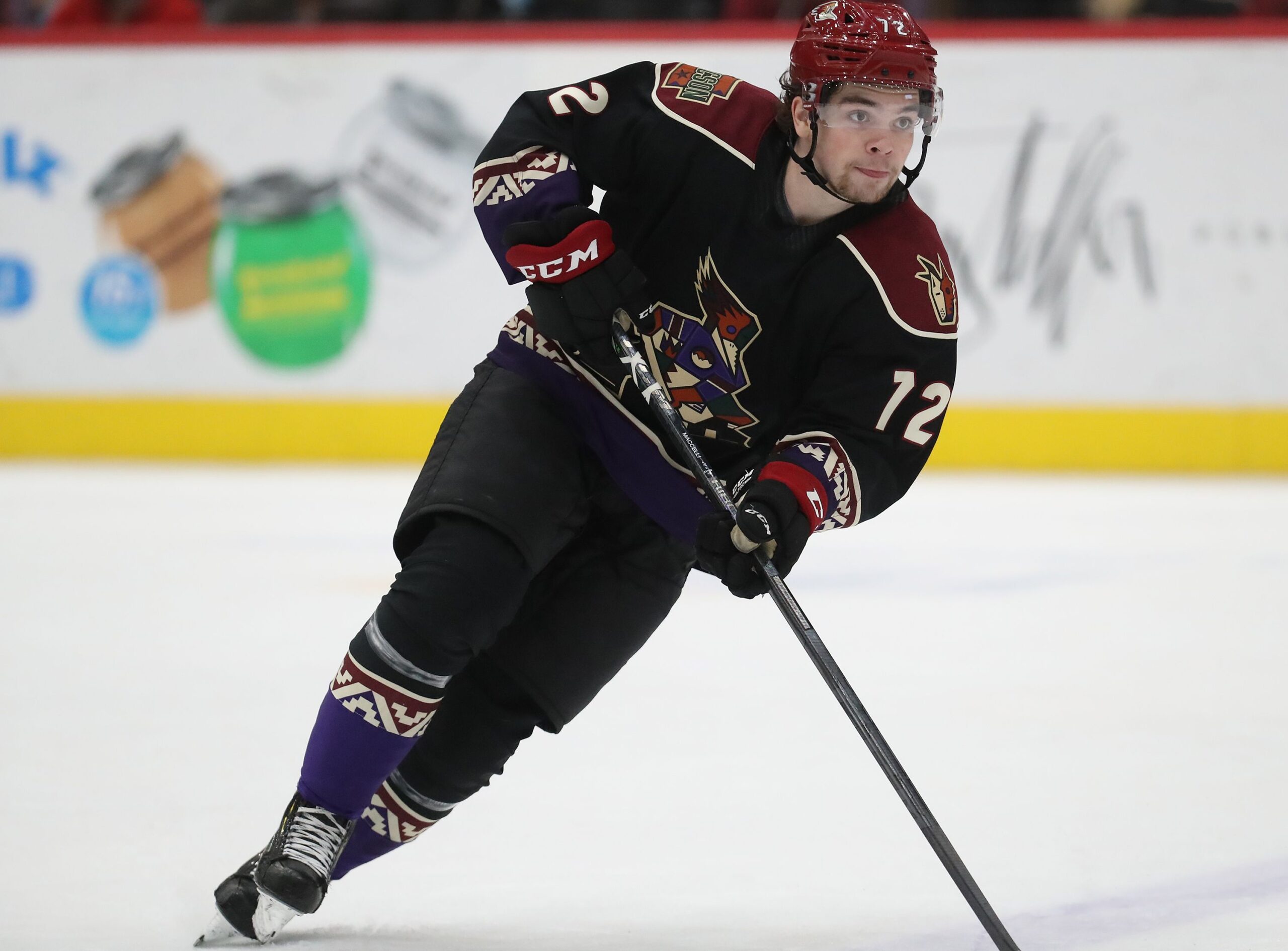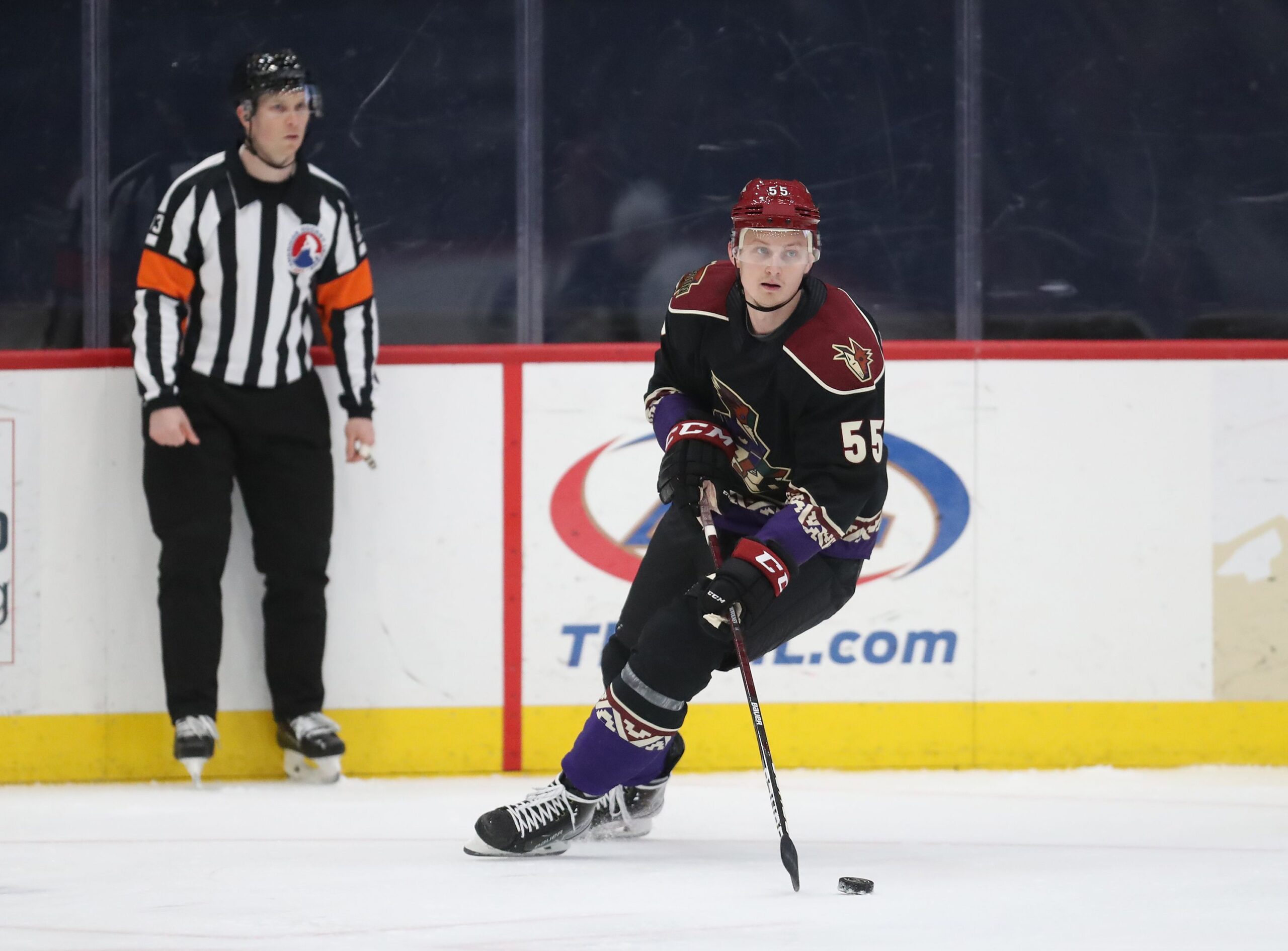© 2026 ALLCITY Network Inc.
All rights reserved.

This is the first in a monthly, in-season series that will update the development of key Coyotes prospects.
Never let it be said that I am unresponsive to readers. You have been asking me to devote more space to Coyotes prospects and voilà, the first PHNX Coyotes prospect report.
Sure, it took me 18 months to respond to your requests, but you persisted through my procrastination.
A warning: I’m not going to update you on every prospect every month. That’s too much information to digest at one time. I also do not intend to focus heavily on statistics, although statistics will be a part of these check-ins. You can find stats on all of these players through just a few minutes worth of research. That’s the surface-level reporting. Besides, statistics are difficult to compare across leagues when those leagues play different styles and comprise players of different levels.
What I want to do with this report is zero in on a handful of prospects each time. I will talk to them on occasion, but what I really want to do is talk to their coaches to get a sense of their development. These players are a part of the Coyotes’ future and clearly, everything within this organization right now is about the future.
So here’s a quick look at the development of Edmonton Oil Kings (WHL) forward Dylan Guenther, Harvard center John Farinacci (ECAC), Tucson forward Matias Maccelli and Tucson defenseman Vladislav Provolnev (AHL).

Dylan Guenther
When the Coyotes sent Dylan Guenther back to the Oil Kings on Oct. 1, (midway through Arizona’s training camp), Edmonton coach Brad Lauer expected a little bit of disappointment from his star forward about not making the NHL team. It showed in his start. He had just one goal and three points in his first six games, but the predominant reason for that slow start was a switch from the wing to the center position.
“When we moved him to center, he was doing more thinking while he was coming back for positioning and that slows his game down,” Lauer said. “The process part of the game, the reactionary part of his game wasn’t there like I know it can be and to me, that was just because of positional play; thinking about where he needs to be. It wasn’t exactly a natural instinct for him.”
Lauer needed help at the center position this season, but he also felt that the switch would be good for Guenther’s development.
“He played center most of his minor hockey career, except for that one year in bantam where he moved over to the wing,” Lauer said. “We talked to him in the summer about trying it. I think the more positions you can play, you become a more versatile player.
“Nowadays with the way coaching is, we don’t coach center, left wing, right wing. It’s F1, F2, F3. You have to understand all the positions coming back to the D-zone. You can’t expect your centerman, if he’s in the offensive zone down below the goal line battling for a puck and it gets kicked out, that he’s got to be the first man back. It’s impossible, so a lot of the stuff that we do now is about the first forward, second forward and third forward coming back to the D-zone and understanding those responsibilities at each position.”
Lauer said Guenther grasped the nuances quickly.
“I think he understands the position a lot better already,” he said. “We’ve gone through some situational stuff, understanding when he’s coming back to the middle what his routes are. He’s a lot quicker now through the transition routes, getting him into good ice. In D-zone coverages he understands the structure of it, skating out of it and using his speed for transition, and I think that has helped his offensive game.”
In his past 16 games, Guenther has 12 goals and 24 points to climb to ninth in WHL scoring with 27 points, just two points out of fourth. He is also doing that thing for which he earned the nickname Gunner: he’s shooting the puck. Guenther is second in the WHL with 96. Regina star Connor Bedard leads with 109.
“He’s playing very well for us right now,” Lauer said. “He’s doing what we expected him to do, and that is to contribute and dominate and be a factor in every game.
“Against Lethbridge, he got the puck in good position and in stride, and everyone was kind of on their heels. He was at full speed and it was just another level of speed and skill where he was able to beat both D and take the puck in and score a goal. When he’s moving his feet, you know he’s engaged in the game and that’s where he is right now with his game.”

John Farinacci
John Farinacci had a more unusual 2020-21 season than most hockey players. After helping the United States capture the World Junior Championship on Jan. 5 with a 2-0 win against Canada, Farinacci joined a bunch of Harvard teammates in Tampa (on their own dimes) to train with Brett Strot, who has worked with USA Hockey. The Ivy League canceled all winter sports last season so Harvard did not play a game.
Between a seven-game stint with Muskegon of the USHL, and seven games with the United States, Farinacci did not play many games last season, but his decision not to return to Muskegon after the World Junior Championship was rooted in opportunity.
“I just felt like since August I had already played a mini-season,” he said. “I was in Toronto training with Gary Roberts for a couple of months, I was in the USHL for two and half months and then in Michigan (at Team USA camp) for a couple weeks and in Edmonton (World Juniors) for a month.
“I really wanted the chance to work out and do some off-ice development like you do in the summer. With everything that had been going on, I didn’t feel like I got the best chance to do that, so I felt like going down to Tampa was the best opportunity to work on stuff like my pace of play, my speed, my skating.”
Farinacci’s production isn’t jumping off of the page. He has two goals and five points in nine games. Harvard coach Ted Donato, who is also Farinacci’s uncle, isn’t concerned with the numbers for a couple of reasons.
“The points will come with the way he’s playing,” Donato said. “He’s had plenty of opportunities. I think in the first game of the year he had something like 14 shot attempts so he’s been around the puck. He’s playing a really solid two-way game and we use him in every situation. He’s playing on the power play. He’s killing penalties. We use him in three on three, he takes big faceoffs for us.”
Farinacci has also had to fill a leadership role a bit earlier than expected.
“We’ve got quite a few young guys trying to play college hockey for the first time because of what happened last season,” Donato said. “You have a sophomore class that hasn’t played college hockey yet, a freshman class that hasn’t played college hockey yet, and then some older guys, many of which didn’t play a season last year, so it’s been a little bit of a transition for us early on here.
“John has been on our top couple lines the entire year, but we’ve moved him around a little bit in different spots where we’re still a little bit inexperienced. It’s been a little bit of a challenge when a guy like John has gone from playing his first year in college to being asked to be a veteran and play in all situations and carry some younger guys along, but that’s the reality of the situation we’re in.”
When Farinacci returned from a successful stint at the World Junior Championship (five goals, seven points in seven games), Coyotes GM Bill Armstrong noted his ability to make an impact wherever he plays. Donato has seen the same thing.
“He’s one of these guys that always seems to be able to find his way around the net,” Donato said. “Sometimes, they’re really pretty goals, and sometimes they’re really greasy, but either way he finds a way when all else around them seems to be failing. He’ll get a tip on a puck, or take it to the net in a real tight area.
“I think he’s also really good at adapting to playing with different guys and different styles. He’s skilled enough to be able to play a game off the rush, but he’s also strong enough on the puck and competitive enough to be able to play down below the goal line and hold on to pucks, which makes him a real versatile offensive player and a guy that is able to be very sound defensively. He just makes himself into a real useful player in all situations.”

Matias Maccelli
The American Hockey League named Maccelli its rookie of the month for November on Wednesday. Maccelli had six goals and 14 points in eight November games, putting him in a tie for ninth place in AHL points with 17 in 14 games.
Maccelli played two seasons with Dubuque of the USHL from 2017-19, but after two years in the Finnish SM-liiga, he said needed time to locate the muscle memory he had developed for the North American game.
“The first couple of games, guys were coming at me faster than I was used to and I didn’t have a lot of touches on the puck,” Maccelli said. “I had to get used to the ice; it’s a little smaller in North America. When you’re playing on the big rink, there’s a lot of space and time. You definitely forget in two years so it was just trying to remember all the stuff that you have to do to play well.”
After bouncing between linemates earlier in the season, Maccelli has primarily played with Michael Carcone and Cameron Hebig of late. Roadrunners coach Jay Varady likes what he has seen.
“He makes plays and he’s obviously been producing offensively, but he’s doing a good job at both ends of the rink right now,” Varady said. “He’s got a deceptive speed about him that allows him to get in and out of situations and I think he’s become a well-rounded offensive player.”
Varady watched a lot of video on Maccelli while he was in Finland, including a stint playing alongside Coyotes center Barrett Hayton.
“It was really just a question of what his transition to the North American game would look like after playing two years of pro in a really good league in Finland,” Varady said. “I think just being a regular contributor to a winning environment, the fundamentals of the game and playing the right way in all situations — the ability to play a solid two-way 200-foot game — is one of the challenges for lots of the players in the American league.”
Like any AHL player, Maccelli is hoping for a call-up and an NHL opportunity, but he knows that all comes down to him.
“Getting a little stronger at the gym is one big thing for me, to be able to battle in the corners against big guys, and then just positioning myself in the right spots on the ice and playing a little better without the puck,” he said. “I’m just trying to stay in the moment and go day by day because I have nothing to say about it. It’s not my call, so I’m just trying to do my best and hopefully, it will happen.”
On the plus side, Maccelli finally bought a car so he isn’t stuck in an apartment the way he had been for the first few months of his life in Tucson.
“I haven’t done much yet; just going to the rink and going home,” he said. “Now I’m exploring the city more.”

Vladislav Provolnev
When the Coyotes signed Severstal Cherepovets (KHL) free-agent defenseman Vladislav Provolnev to a one-year contract in March, the thought was that he would have a legitimate chance to compete for the No. 6 or 7 defenseman spot on the team. At the time, GM Bill Armstrong had hoped to get him to Tucson for the end of the 2020-21 season to get his feet wet in the North American game, but COVID-19 impacted the work visa process and Provolnev didn’t make it over until the summer.
Provolnev showed off his physical game when he laid a few big hits during the Rookie Faceoff Tournament, but he was a healthy scratch for the first two games of the season before the Coyotes assigned him to Tucson to get some work. In 11 games, he does not have a point, but that really isn’t his role.
“He’s an aggressive defender,” Varady said. “He plays hard, he competes, he finishes checks. Those are some unbelievable attributes. The other thing that he’s got is he’s just got a cannon of a shot. It’s really, really dangerous. So those are things that he has that are assets and in terms of improvement, he’s just working on the team game right now.”
The biggest challenge for Provolnev, Varady said, has come off the ice.
“He’s making huge strides on the ice but I think the thing that’s hardest for him right now is the English language,” Varady said. “It would be like dropping one of us in Russia. We wouldn’t understand a whole lot.
“He’s taking English lessons two or three times a week. He’s got someone who is working with him. What it does is it allows him to come to the rink, and every day be even more communicative with his coaches and his teammates.”
With Conor Timmins out for the season after ACL surgery, it would not be a surprise to see Provolnev get a recall at some point. If he does come up the I-10, Varady said he will bring those big hits with him.
“He does that once or twice every game here,” Varady said. “It’s fun to watch.”
Follow Craig Morgan on Twitter
Comments
Share your thoughts
Join the conversation



